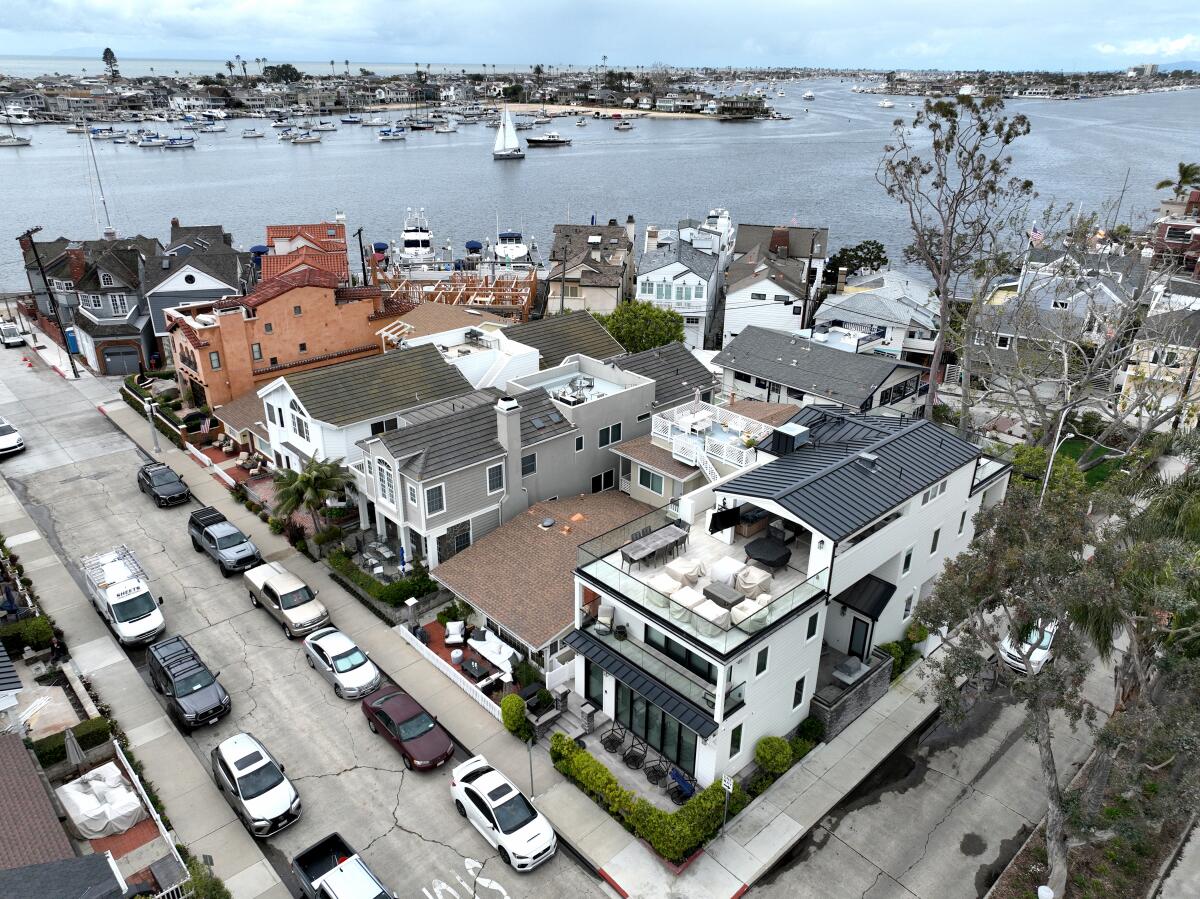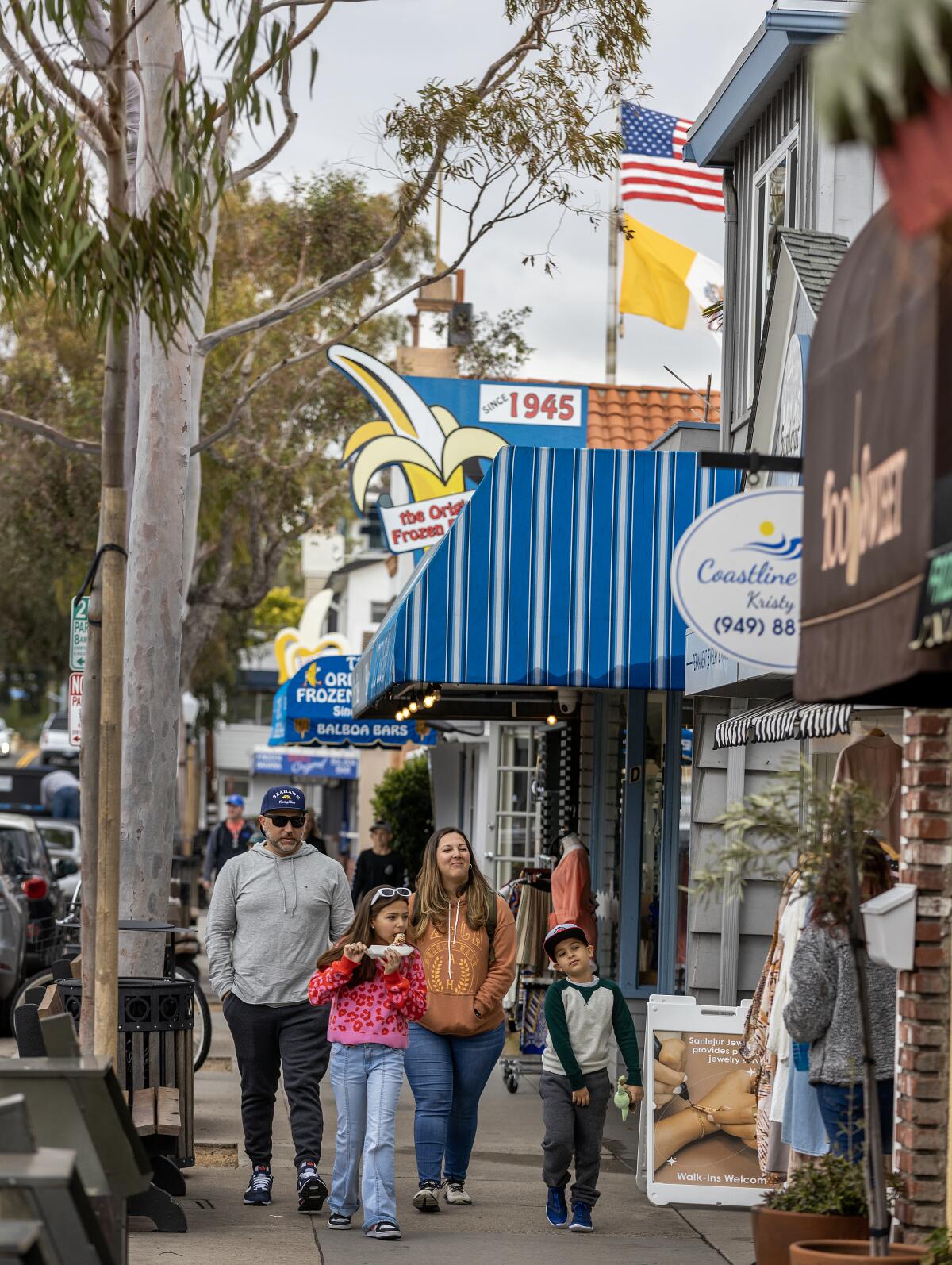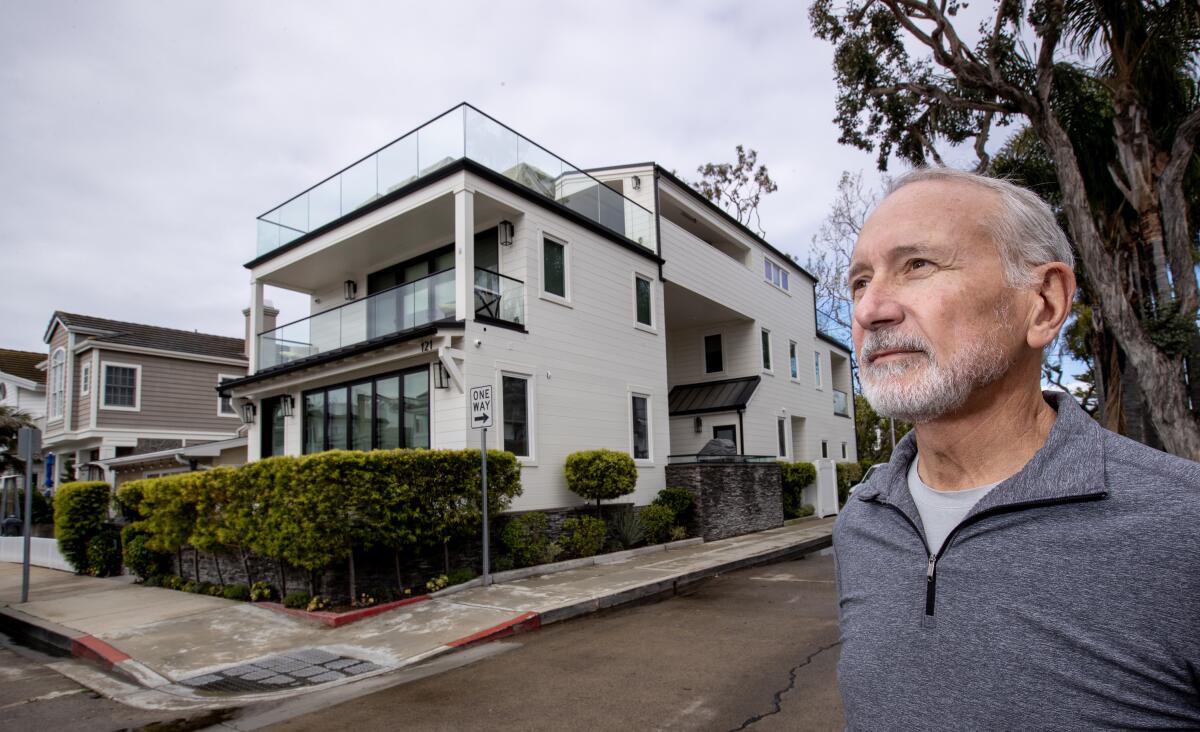Newport Beach battles a new breed of luxury party houses: fractional ownership

- Share via
Max Gardner and his wife, Artyn, decided to sell their home in Irvine and move to Balboa Island eight years ago because they wanted something more than a comfortable place to live. They were hunting for a lifestyle.
On this tony man-made island in Newport Beach, stately homes with street-facing patios are clustered together on avenues named after gemstones. Residents zip around in golf carts, taking in the harbor boats, art fairs and chic boutiques. Visitors ride in on a ferry to buy frozen bananas from a sweet shop that inspired the family banana stand on the TV sitcom “Arrested Development.”
People who live here are fierce defenders of the island’s cozy charm. They’ve battled the Federal Aviation Administration over jet noise from nearby John Wayne Airport and successfully fought to regulate short-term vacation rentals.
Now, residents have set their sights on a burgeoning real estate trend known as fractional home ownership, in which multiple people, often strangers, own a small share of a luxury single-family home that they use as a vacation property. It’s a twist on timeshares that, as many locals see it, plays to wealthy out-of-towners looking for a place to party rather than live.

“It doesn’t fit in this community at all,” said Artyn Gardner, 71. “I guess if you were in a resort area where everybody was turning over, like a timeshare in a Marriott on the beach somewhere, maybe it would fit there. But that’s not Balboa Island. It’s just not why we live here.”
The concept of co-owning vacation properties has been around for decades, with shared ownership of cookie-cutter condos and town homes a common practice at sprawling hotel resorts. What’s happening in Newport Beach and other destination cities is a modern offshoot that gained speed during the pandemic: People penned up at home sought the safety and reliability of a consistent travel destination — except instead of buying time at a resort property, they buy a fraction of a single-family home in an established residential neighborhood.
As the practice has accelerated, homeowners have started to mobilize, raising the same concerns about noise and trash that have been levied in calls to regulate Airbnb-style short-term rentals. They paint fractional ownership as just one more scheme for converting neighborhood homes into vacation carousels for rich people who flit in and out with no real stake in a community.
In California, much of that ire focuses on Pacaso, a San Francisco-based start-up founded in 2020 that has refined the concept into a lucrative business model. Pacaso specializes in luxury second homes, buying single-family houses in select communities across the U.S. In California, that includes coastal enclaves like Newport Beach and Carmel, idyllic wine country settings like Sonoma Valley and posh resort towns like Palm Springs.

Pacaso sets up a limited liability corporation to buy a property, then divides the LLC into eight ownership shares that it sells on its website. Buying one share in a home entitles a co-owner to 44 nights a year, with each visit limited to two weeks. Buying additional shares equates to more stays. For a monthly fee, Pacaso manages the booking logistics, cleaning and maintenance.
On a video on the company’s website, co-founder Austin Allison says he was inspired to start Pacaso after he and his wife bought their second home in Lake Tahoe. He lays out a lofty vision for “making the dream of second homeownership possible for more people.” And he likens the company’s creative aspirations to those of artist Pablo Picasso, whose Cubism, he says, brought together “individual elements to create a more beautiful collective whole.”
Fred Levine is among the longtime Newport Beach residents who say they aren’t buying the egalitarian spiel.
Levine, who moved to the Balboa Peninsula three decades ago, said allowing fractional home ownership to proliferate would be as disruptive as short-term rentals.
“Come down and visit, but when you have businesses come in, it can really mess up a whole neighborhood,” Levine said. “I’ve lived next to short-term rentals, and it’s an absolute horror story. It’s not quiet and peaceful and cookies and bubblegum and walking their dog. That’s not what really happens.”
Palm Springs is a hotbed for short-term rentals. Toting decibel readers and citations books, the desert city’s Airbnb police make sure things don’t get too out of hand.
On Balboa Island, the Gardners now sit just across the street from a Pacaso home. The four-bedroom, four-and-a-half bath contemporary Cape Cod-style home is listed on Pacaso’s website at $940,000 for a one-eighth share. The home has a rooftop deck with a whirlpool bath, foosball table and TV.
While paying something close to a million dollars for one-eighth share of a home might seem steep, it’s a steal in a neighborhood where similarly styled homes — sold traditional style — hit the market at upward of $4 million.

Max Gardner, 71, said that when he first heard his neighbor had sold to Pacaso, he was circumspect but open to getting to know the new residents. On their street — Emerald Avenue — the neighbors are so tight-knit they meet for weekly outdoor happy hours and travel on group vacations. They call themselves “the Emeralds.”
But he said it wasn’t long before the disruptions started. As the Gardners tell it, one co-owner crashed a golf cart and another threw a raucous party that kept the neighborhood awake into the early morning hours. When a frustrated neighbor called police, the co-owner was incensed. After the cops left, he stood shirtless on his rooftop deck and screamed a message to his new neighbors:
“I’m gonna find out who called the cops, and I’m gonna f— them,” Gardner recalled.
That owner eventually sold his shares in the home after neighbors complained and had meetings with Pacaso representatives. But, Gardner said the situation took time and was “like pulling teeth.”
He’s had a better experience with some of the other co-owners but said connecting as neighbors has proven challenging. “We’ve had a couple of them over for a glass of wine, because we want them to be part of the community,” he said. “But it’s really hard to get to know them when they’re only here two or three weeks a year.”
Across the state, city leaders, initially caught off guard, are rushing to regulate the business model.
Officials in Palm Springs and Monterey County have sent cease-and-desist letters to Pacaso, directing the company to stop advertising and selling fractional ownership in certain areas, arguing its just a fancy form of timeshare and should adhere to the same restrictions. Carmel, Sonoma and St. Helena are moving to limit or outright ban Pacaso’s operation. In Beverly Hills, planning commissioners this month expressed support for an ordinance that would prohibit fractional ownership in the city.
In Newport Beach, the City Council devoted a March 14 hearing to the issue, debating whether to expand an existing ordinance that prohibits timeshares in residential zones to also encompass fractional ownership properties. The move, if approved by city leaders and the California Coastal Commission, would effectively ban Pacaso from acquiring new homes across much of the city. It’s not clear how the ordinance would affect the dozen or so homes Pacaso already manages in Newport Beach.
“If it acts like a timeshare,” said Councilman Joe Stapleton, who represents the Balboa Peninsula, “we should probably regulate it like a timeshare.”
As opposition has mounted, Pacaso has stood its ground. After St. Helena signaled it was considering banning Pacaso, the company sued, arguing in court records that the “dishonest campaign” was rooted in snobbery.
The city has “sought to preclude Pacaso and its homeowners from enjoying the benefits of secondary home ownership in St. Helena — a privilege that they have sought to reserve only for those in the upper echelon of financial status. Sadly, this is just the latest chapter in a long history of improper attempts by the city to exclude outsiders from the community,” the company said in its legal filings.

Pacaso maintains its model does not equate to a timeshare, which generally involves multiple people paying to secure specific days or weeks at a property without owning anything. The co-owners of the properties they manage, the company argues, have a financial stake in the home and should have the same rights as other neighborhood residents.
“Co-ownership has been used by friends, families and individuals to own real estate for generations,” Chrissy Bruchey, a Pacaso spokesperson said in a statement. “Many existing homes within Newport Beach are co-owned through a multi-owner arrangement like an LLC or trust, no different than how Pacaso homeowners own their homes.”
Dick Ragatz, president of the market research firm Ragatz Associates, tracks the resort real estate industry. He said fractional home ownership is attracting buyers who want to purchase in luxury markets but who might not have the cash or desire to shell out for the full price of a home that would likely sit empty most of the year. The typical buyer is “high income and well educated,” Ragatz said.
As L.A.’s new “mansion tax” looms, realtors are giving away a free Bentley or Aston Martin with a home purchase before the April 1 deadline to avoid paying the tax.
Scott Hansen, who owns a quarter interest in a Pacaso home on Ocean Boulevard in Corona del Mar, echoed that sentiment in a letter to the Newport Beach City Council defending the fractional ownership model. He said what appealed to him most about shared ownership was that the house wouldn’t sit empty. He said his family, who live outside Sacramento, also have a second home in Lake Tahoe that isn’t used often.
“Limiting home ownership to only those who purchase 100% of the home would be a tremendous mistake,” he wrote. “Businesses benefit from having homes that people reside in as opposed to empty homes.”
But for many others who lined up to address city leaders at the March 14 hearing, the concern was not what’s good for business — but what makes for good neighborhoods.
When Gardner took his turn at the podium inside the packed council chambers, he urged officials to also consider regulations for existing Pacaso homes that he figures will be grandfathered in if the city moves to prohibit new fractional home ownership.
“There are very nice people who live in the Pacaso house now,” he told the council. “I could tell you some war stories about ones who have been there before.”
More to Read
Sign up for Essential California
The most important California stories and recommendations in your inbox every morning.
You may occasionally receive promotional content from the Los Angeles Times.













